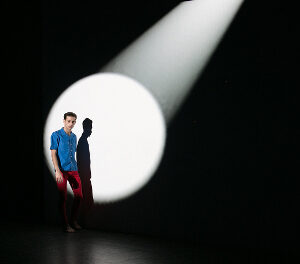 Music for a Great Space opened its 30th season Friday night with a virtual concert by the Charlestones, a male a cappella quartet from (of course) Charleston, SC. The singers – Todd Monsell (bass), Brink Norton (tenor), William Purcell (lead), and Stephen Spaulding (baritone) – gave their first concert in 2014. (Bios of the singers may be read here.)
Music for a Great Space opened its 30th season Friday night with a virtual concert by the Charlestones, a male a cappella quartet from (of course) Charleston, SC. The singers – Todd Monsell (bass), Brink Norton (tenor), William Purcell (lead), and Stephen Spaulding (baritone) – gave their first concert in 2014. (Bios of the singers may be read here.)
The performance featured many groupings, starting with “Brotherhood,” which was one number, “Brothers, Sing On!” (Edvard Grieg, arr. Robert McKinney, words by Herbert Dalmas). Some technical issues made the first piece a bit muddy, but the rest of the concert continued without a hitch.
“Renaissance Men” featured four pieces, starting with “O Magnum Mysterium” (Tomas Luis de Victoria) a slowly unfolding gentle piece, with four very independent parts. “Fa una canzona” (Orazio Vecchi, arr. William Powell) is an upbeat piece, full of dance rhythms. “Weep, O Mine Eyes” (John Bennet, arr. Powell) is doleful, and the quartet caught that spirit perfectly. “Cantate Domino” (Giuseppe Ottavio Pitoni, arr. John Leavitt), a jubilant number, rounded out the set that displayed the quartet’s fine ensemble.
Each member of the group introduced himself, and while the church’s acoustics are good for singing, it’s not so great for speaking. A bit too much reverberation.
“Jesus Christ the Apple Tree” (Elizabeth Poston, anonymous words) started the “Sacred Hymns and Songs” portion. The piece begins in unison, but eventually breaks into four parts; It is a gentle contemplation on life. “Beautiful Savior” (traditional, arr. Vocal Spectrum, words by Joseph Seiss), is a well-known hymn presented in an attractive arrangement that displayed the impressive vocal range of the quartet. “How Can I Keep from Singing?” (Shaker Hymn, arr. Todd Monsell) proved to be a fresh setting by one of the quartet members of this traditional hymn. “The Heav’ns Resounding” (words and music by Ludwig van Beethoven) was sturdily sung.
“American Spirituals arranged by African-Americans” received a heartfelt presentation, with some wonderful, unexpected harmonies: “Standing in the Need of Prayer” (arr. John Carter), “Steal Away” (arr. Brazeal Dennard), and “Poor Man Lazrus” (arr. Jester Hairston) made up the set. The last one was a particularly fun song, sung with gusto; it displayed some impressive soft singing.
The quartet is comprised of four individual vocal colors, which made for a distinctive sound, but didn’t always melt into a smooth blend. And while the group was not always in tune, the musicians always sang with dedication and excellent musicality.
The lovely ballad “Maria” (West Side Story) (Leonard Bernstein, words by Stephen Sondheim) began the “From the Broadway Stage” set. “Summertime” (Porgy and Bess) (words and music by George and Ira Gershwin, words by Dubose Heyward, arr. Richard Lengel) was a winning arrangement. “Dear Theodosia” (Hamilton) (Words and music by Lin-Manuel Miranda, arr. Todd Monsell) brought the Broadway songs to the contemporary times.
“A Trio of Jazz Standards” began with an attractive version of “Embraceable You” (George Gershwin, words by Ira Gershwin, arr. Ed Lojeski). “Georgia on My Mind” (Hoagy Carmichael, words by Stuart Gorrell, arr. Ed. Lojeski) always brings to mind Ray Charles’ version. This was a significantly different take on the tune. “The Nearness of You” (Hoagy Carmichael, words by Ned Washington, arr. Kirby Shaw) featured some tight harmonies.
“From the Pop Charts – Songs Recorded by African-American Artists” started with “Sh-Boom” (words and music by Keyes/Feaster/McRae/Williams, arr. Anne Raugh) added doo-wop to the mix! “The Lion Sleeps Tonight” (words and music by Linda/Peretti/Creatore/Weiss, arr. Scott Turnbull) presented an arrangement close to the Tokens’ original. “Drift Away” (words and music by Mentor Williams, arr. Kirby Shaw), made popular by Dobie Gray, included some finger-snapping.
The quartet thanked MGS for the opportunity to sing together, which it hasn’t done for several months because of the pandemic.
A live question and answer followed, offering a creative way to interact with the artists. Several questions were posed by audience members. I learned that while the group does sing barbershop literature, they don’t consider themselves Barbershop because they snap fingers, which apparently is not acceptable in barbershop etiquette.
This MGS concert is the first of three virtual concerts this fall. We look forward to hearing more “live” music from our computers.











